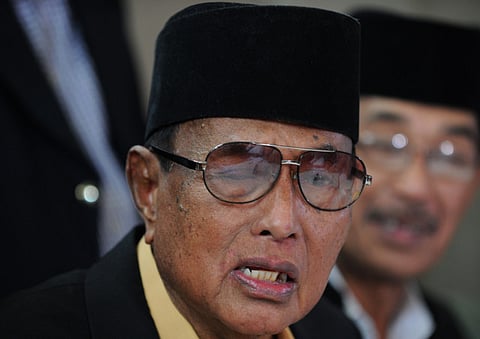Philippines President Aquino in a bind over Sabah crisis
Justice department reviewing legality of claims

Manila: Philippine president Benigno Aquino has been doing a balancing act in handling the violence that has ensued following the occupation by more than 200 followers of a Filipino Sultan who occupied a village in Sabah, observers said.
“The government cannot be forced to take a stand with the crisis ongoing,” said Philippine Justice Secretary Leila de Lima. “Negotiations on the Saba claim are possible [only] if the crisis there is over. It’s impossible to hold talks while there’s an ongoing crisis.”
The justice department has been reviewing the policies of previous presidents about the legality of the claims by the Sultanate of Sulu and the Philippine government over Sabah. “Hopefully, this will be used as guide to peacefully resolve the Sabah conflict,” said the justice secretary.
But Aquino has been criticised for allegedly not expressing concern for members of the Royal Sultanate of Sulu, led by Sultan Jamalul Kiram III, who have been targeted by full ground and air operations by Malaysian forces in Tanduao village since last week. Aquino has also been accused of not making an independent foreign affairs policy with Malaysia and for not protecting the Philippines’ claim over Sabah, which began in the early 1960s.
“If the president wants a peaceful solution to the Sabah crisis, he should have made a stronger move with the Malaysian leaders,” said Rene Sta. Cruz, a broadcast journalist, on his television programme.
There are several reasons why Aquino has been in a bind. He could not countenance a non-government initiative that was unilaterally done by Kiram’s group and he is limited to diplomatic engagement with Malaysia, a fellow member of the Philippines in the 10-state Association of South-east Asian Nations (Asean) and also the peace broker (since 2004) in the ongoing peace settlement being forged by the Philippine government and the formerly secessionist Moro Islamic Liberation Front (Milf).
As a result, Aquino could not match the strategic moves made by Philippine government officials in pushing for the Sabah claim since the early 60s, observed a professor of the University of the Philippines who requested anonymity.
In 1962, Sultan Esmail Kiram (born 1907), who held the position from 1947 to 1973, granted the Philippine government the right to claim Sabah. In response, former Philippine president Diosdado Macapagal filed the Philippine government’s claim at the United Nations.
On July 31, 1963, presidents Tunku Abdul Rahman of Malaysia, Macapagal and Suharto of Indonesia held talks and signed the Manila Accord, which granted respect for “the claim of the Philippines over Sabah, even if Sabah had been included in the Federation of Malaysia”.
Even earlier, from January 28, 1963 to February 1, 1963, a Philippine delegation led by former vice president Emmanuel Pelaez, who was also foreign affairs secretary, joined the so-called London Talks and presented to the British delegation the historical and legal claim of the Philippines over Sabah.
But the United Kingdom decided to give up North Borneo, after it was turned over by the British North Borneo Company to the Federation of Malaysia, in favour of Malaysia’s independence. Results of the UN’s Malaysia Mission firmed up the establishment of the Federation of Malaysia on September 16, 1963.
Sign up for the Daily Briefing
Get the latest news and updates straight to your inbox



